Overview
Best practices for online document storage are essential for ensuring both security and efficiency. Strategies such as:
- Encryption
- Access controls
- Automated workflows
play a pivotal role in this regard. By adopting these practices, organizations not only safeguard sensitive information but also significantly enhance operational efficiency. This dual benefit is crucial for legal firms navigating the complexities of digital file management, where the stakes are high and the need for reliable solutions is paramount.
Introduction
In an increasingly digital world, organisations are facing unprecedented challenges in managing their documents. The evolution of document management is critical, particularly for businesses across various sectors, including legal and healthcare. Online document storage has emerged as a vital solution, enabling these organisations to store, share, and retrieve files seamlessly. As companies navigate the complexities of digital transformation, understanding the nuances of online document storage becomes essential for fostering collaboration and enhancing operational efficiency.
With the surge in remote work and the growing need for secure data management, solutions like MyDocSafe are paving the way for organisations to streamline their document handling processes. These solutions not only enhance efficiency but also ensure compliance with regulatory standards. This article delves into the myriad benefits of online document storage, best practices for security, and the strategic advantages of leveraging automation in document management. By equipping businesses with this knowledge, they can thrive in the digital landscape and effectively address the evolving demands of their operations.
Understanding Online Document Storage: An Overview
Online file management represents a pivotal shift in document storage, allowing for the saving of digital files on remote servers accessible via the internet. This method empowers companies, particularly in sectors such as legal, healthcare, and real estate, to manage, share, and access files without the constraints of physical solutions. As organisations increasingly embrace digital transformation, understanding online file management becomes imperative.
Not only does this approach streamline access to critical files, but it also fosters collaboration among teams, irrespective of their geographical locations.
The myriad advantages of online document storage are unmistakable. For instance, integrated functionalities—such as file organisation, retrieval, and sharing—significantly enhance operational efficiency, rendering these solutions indispensable in today’s business landscape. MyDocSafe exemplifies this by providing customisable data rooms tailored for various transaction types, including M&A, insolvency, and real estate.
A recent report revealed that 83% of participants indicated that at least half of their sensitive information remains unencrypted while stored in the cloud, underscoring the urgent need for secure solutions that prioritise data protection.
Current trends in online file management indicate a growing reliance on cloud-based systems, with projections suggesting significant growth in sectors like healthcare, where document storage solutions are expected to evolve from 2025 to 2034. This shift is driven by the increasing demand for secure, scalable, and efficient solutions capable of managing the vast amounts of data generated daily. MyDocSafe’s comprehensive client portal and e-signature software enhance client onboarding and engagement, ensuring that sensitive materials are handled securely and efficiently.
The e-signature feature streamlines the signing process, enabling swift and secure approvals for clients. Successful applications of online file archiving have been observed across various sectors, including legal, healthcare, and real estate. These sectors benefit from improved record handling capabilities, which not only enhance compliance with regulations but also simplify client interactions.
For example, legal firms utilising this platform report increased efficiency in case management and client onboarding processes due to its automated document distribution and reminders.
Expert insights emphasise the necessity of adopting robust online document storage solutions. As organisations navigate the complexities of data management, grasping the nuances of these systems becomes crucial. The integration of advanced security measures, such as encryption and access controls, is essential for safeguarding sensitive information and ensuring compliance with regulations like GDPR.
Moreover, the security framework of the service, which incorporates encryption standards and adheres to electronic signature legality, enables businesses to thrive in a competitive landscape. In this evolving environment, organisations that prioritise secure online file preservation will be better equipped to confront future challenges. Start your journey with our platform today by taking advantage of our 30-day free trial to discover how our customisable solutions can enhance your file management processes.
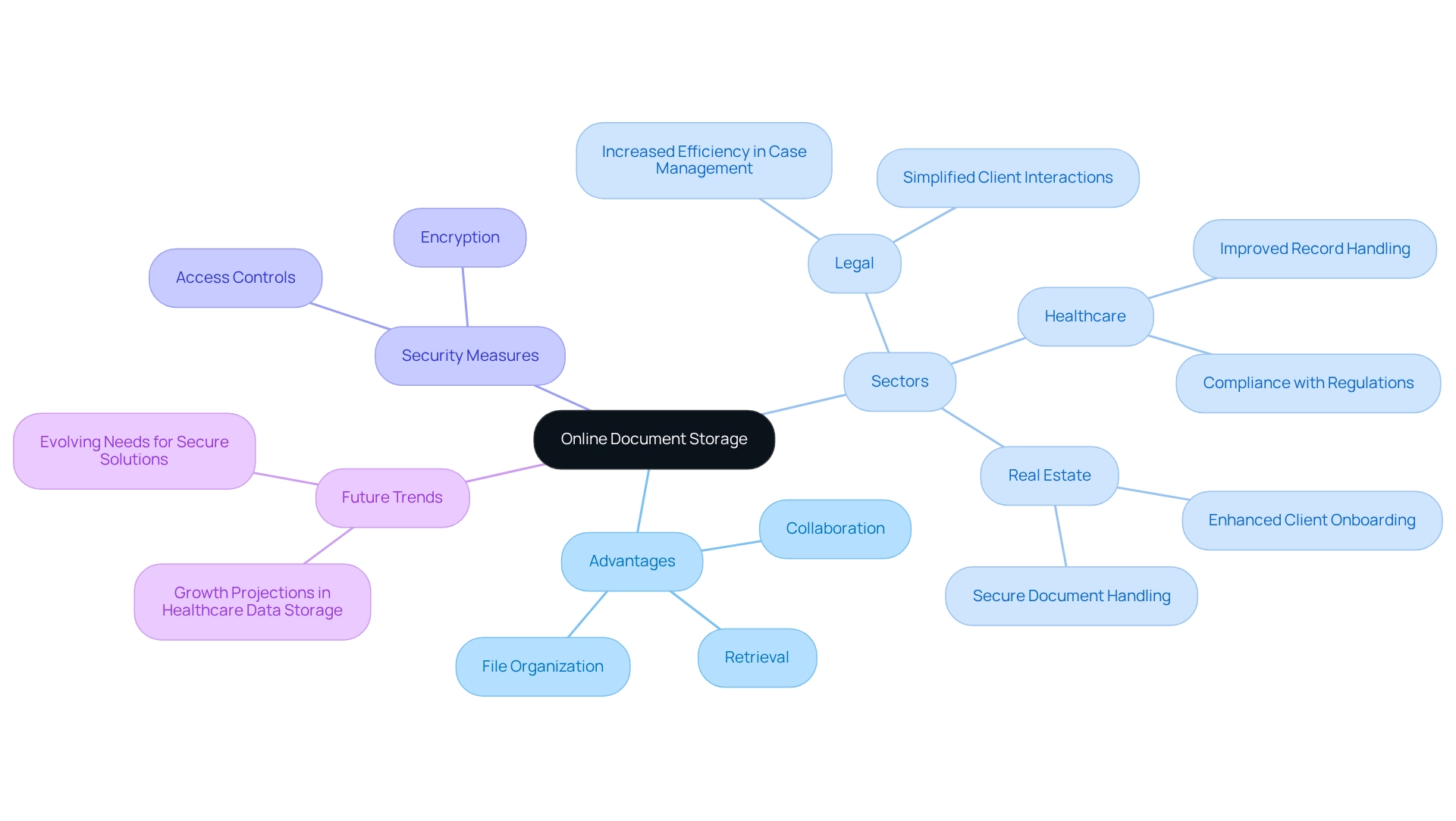
Benefits of Cloud Document Storage: Why It Matters
Document storage online through cloud file preservation presents numerous advantages that can significantly enhance business operations, especially for legal firms seeking secure and effective solutions. This platform serves as an all-inclusive client portal and e-signature application, ensuring not only secure file management but also streamlined client onboarding processes. The key benefits include:
- Accessibility: With the cloud service, users can access document storage online to retrieve files from any location with an internet connection. This capability is crucial for facilitating remote work and enhancing collaboration among teams.
- Cost Efficiency: By minimizing the need for physical infrastructure, the platform leads to substantial reductions in overhead costs. At just £2 per user per month, it can replace multiple services like DocuSign and Dropbox, enabling businesses to allocate resources more effectively.
- Scalability: The platform offers document storage online with the flexibility to adjust storage capacity based on fluctuating demands, ensuring that companies only pay for the storage they genuinely utilise. This adaptability is particularly advantageous in today’s fast-paced market.
- Data Reliability: The service includes automatic backup features, significantly reducing the risk of data loss. This reliability is essential for maintaining business continuity and protecting sensitive information.
Enhanced collaboration is fostered by this platform, allowing multiple users to access and edit documents simultaneously, thereby boosting teamwork and productivity. This collaborative environment is vital for driving innovation and efficiency within organisations.
Document storage online is an indispensable tool for efficiently managing and organising files. The platform supports a customisable workflow and a completely paperless quoting process, enhancing proposals and expediting deal closures while preventing administrative delays.
- Integrations: MyDocSafe offers various integrations that enhance efficiency, simplifying operations for businesses.
As businesses increasingly embrace cloud solutions, the impact on operations is profound. A recent survey revealed that 91% of companies are investing in AI initiatives related to data management, with 92% reporting measurable benefits from these investments. This trend underscores the growing importance of cloud solutions in enhancing business efficiency and decision-making.
Industry experts emphasise that transitioning to cloud solutions is not merely a trend but a necessity for maintaining competitiveness. As Soundarya Jayaraman, a Content Marketing Specialist, articulates, “Even as trends around cloud usage and adoption change, one thing is clear: businesses must go the cloud way to remain competitive and maximise their benefits.”
Moreover, the expansion of the Infrastructure as a Service (IaaS) market is driving innovations in Software as a Service (SaaS) and Platform as a Service (PaaS), further enhancing cloud functionalities. However, it is important to acknowledge that 4 out of 10 companies cite skill shortages as a significant challenge impacting their multi-cloud operations, highlighting the obstacles businesses face in adopting these technologies.
In 2023, the advantages of cloud document storage continue to grow, with statistics indicating that companies leveraging these solutions are better equipped to navigate the complexities of modern business environments. For instance, organisations that have embraced this platform report improved operational efficiency and enhanced capabilities for remote work, making it an essential tool in today’s digital landscape.
To experience these benefits firsthand, start your 30-day free trial with MyDocSafe today!
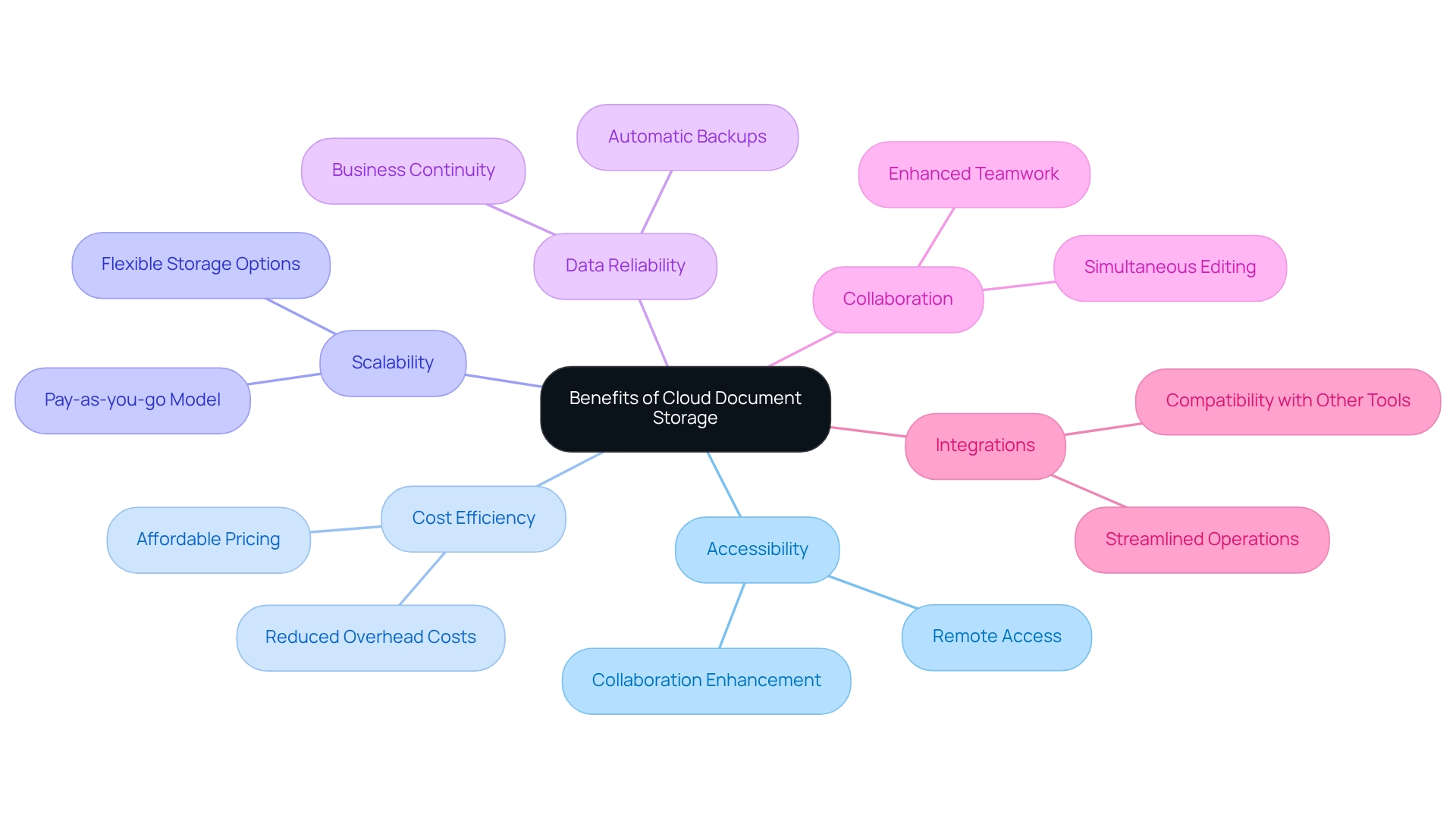
Ensuring Security in Document Storage: Best Practices
To ensure the security of documents stored online, businesses must adopt essential best practices:
- Encryption: Implement robust encryption methods for both data at rest and in transit. This is vital for protecting sensitive information from unauthorized access, as encryption serves as a primary defence mechanism in information security. The service utilises advanced encryption methods to safeguard files, guaranteeing that only permitted users can access sensitive information.
- Access Controls: Establish stringent access controls to limit who can view or modify files. By ensuring that only authorised personnel have access, organisations can significantly reduce the risk of data breaches. The platform’s API facilitates secure integration with OAuth 2, enabling businesses to manage user permissions effectively.
- Regular Audits: Conduct frequent security audits to identify vulnerabilities within the file management system. These audits help ensure compliance with security policies and can reveal areas needing improvement. MyDocSafe supports organisations in maintaining compliance through its comprehensive security measures.
- Multi-Factor Authentication: Enforce multi-factor authentication (MFA) for accessing file storage systems. This extra layer of security makes it more challenging for unauthorized individuals to gain entry, thereby improving overall file security. The integration features enhance the implementation of MFA, further securing sensitive files.
- Data Backup: Regularly back up files to mitigate the risk of data loss due to security breaches or system failures. A solid backup strategy ensures that critical information can be restored quickly, minimizing disruption to business operations. MyDocSafe offers dependable backup options as part of its file handling services.
Integrating these best practices not only improves file security but also aligns with the increasing trend of organisations prioritising document storage online for safe file sharing solutions. Recent statistics indicate that 69% of employees now rely on dedicated file sharing services, driven by concerns over traditional email security. In contrast, 66% of staff use free file sharing platforms, which can pose significant risks.
As companies navigate the complexities of digital file management, the significance of encryption and access controls cannot be overstated. With over 10,000 companies globally using this platform, organisations can rely on established solutions to safeguard their sensitive information. Each file includes a MyDocSafe signing certificate page attached to it, outlining the file journey for each signer, including IP addresses, time stamps, mobile phones used, email addresses, and file fingerprints.
Addressing challenges highlighted in the case study ‘Obstacles to Paperless Office Adoption’ is essential for the successful execution of secure information handling practices. By adopting these strategies, organisations can protect their sensitive information and maintain compliance with evolving regulatory standards.
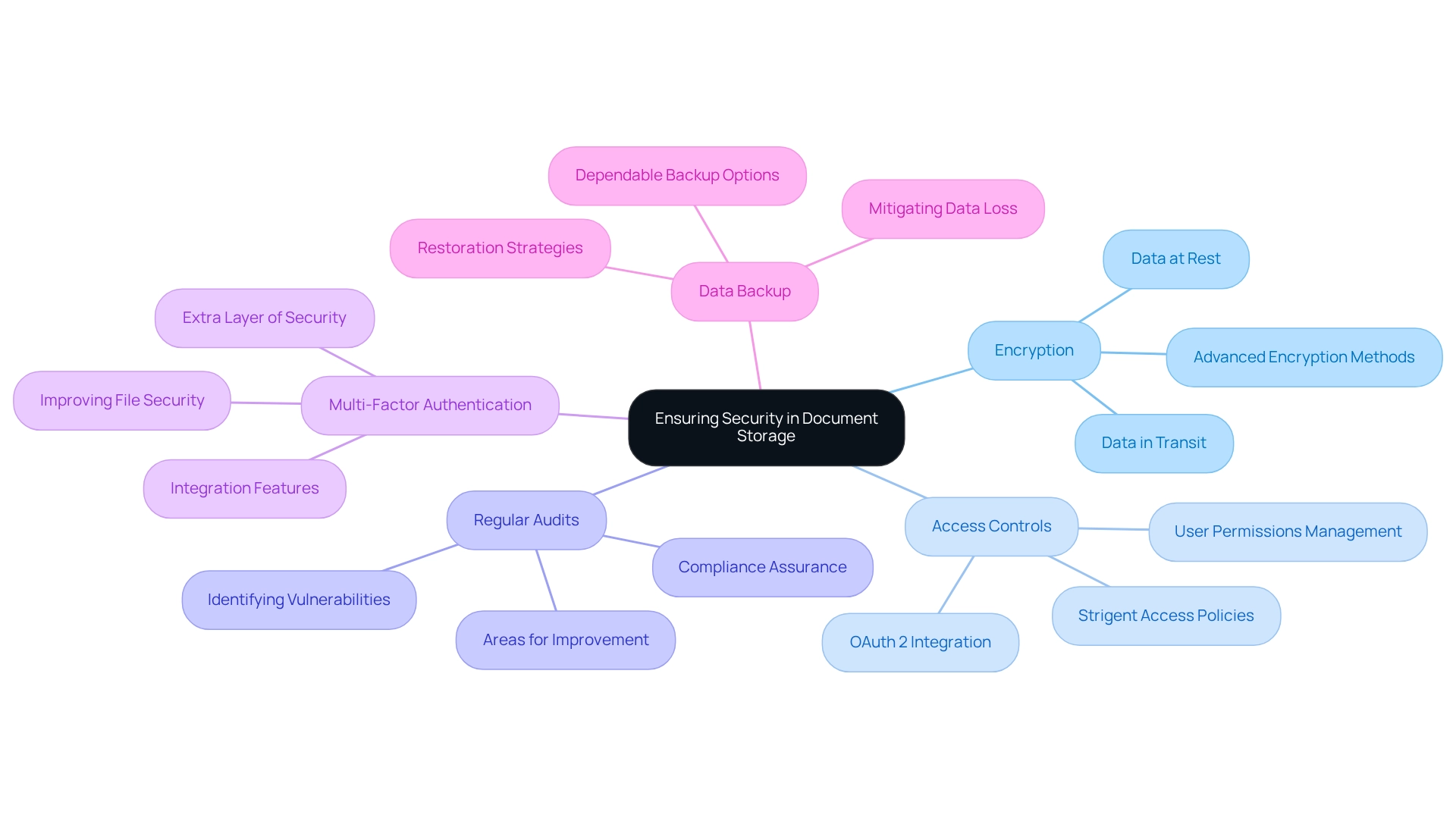
Enhancing Efficiency: Streamlining Document Management
To enhance efficiency in document management, organisations can implement several key strategies:
- Automated Workflows: Utilising management systems with automation capabilities can significantly improve repetitive tasks, such as approvals and notifications. This approach not only reduces the time spent on manual processes but also minimises the risk of errors, leading to a more efficient workflow. The advanced e-signature solutions of this platform further streamline this process, allowing for secure and quick approvals.
- Centralised Storage: Maintaining a centralised file repository is crucial for reducing the time employees spend searching for files. The platform provides secure portals for storing sensitive client files, fostering improved collaboration as team members can easily access and share files. This is particularly vital in today’s remote work environment, where 80% of employees require access to files from mobile devices. Considering that 66% of employees utilise free file-sharing services, the secure management solutions from this company significantly mitigate risks to sensitive information.
- Version Control: Implementing version control is essential for tracking changes and ensuring that all team members are working with the most current version of a file. MyDocSafe’s system offers a clear history of revisions, preventing confusion and enhancing accountability within teams.
- Clear Naming Conventions: Establishing clear naming conventions for files facilitates easy retrieval and organisation. By adopting a systematic method for naming, organisations can significantly reduce the time spent finding files, thereby enhancing efficiency.
- Regular Training: Offering continuous education for employees on best practices in record handling guarantees that everyone is aligned and skilled in their procedures. This investment in employee development can lead to substantial improvements in efficiency, as staff become more adept at utilising MyDocSafe’s tools and systems.
The significance of these strategies is underscored by the reality that 97% of firms have limited or no record handling procedures established, which can impede their competitiveness. By adopting these best practices, organisations can not only enhance their document storage online efficiency but also ensure compliance with regulations and improve overall productivity.
Case studies have demonstrated that companies employing centralised storage and automated workflows, like those provided by other services, experience substantial enhancements in collaboration and efficiency. For example, testimonials emphasise how the service has revolutionised client contract oversight, showcasing its efficiency in practical applications. As noted by Tara Kachaturoff, the simplicity of handling client contracts with MyDocSafe affirms the advantages of efficient file handling systems, highlighting the necessity for organisations, especially legal firms, to invest in these solutions.
Furthermore, the case study titled ‘The Importance of Document Management Systems’ illustrates how these systems are essential for modern businesses to effectively manage increasing volumes of data through document storage online, ensuring security and compliance with regulations, thus improving overall efficiency and productivity.

Compliance Considerations: Meeting Regulatory Standards
Organisations operating within regulated sectors must prioritise adherence in their record handling strategies. Essential compliance considerations are crucial for effective management:
- Data Retention Policies: Developing comprehensive data retention policies is vital. These policies should clearly outline the duration for which records must be retained and the procedures for their eventual disposal. This not only aids in regulatory compliance but also enhances operational efficiency, particularly in sectors such as legal services, healthcare, and finance, where solutions are tailored to meet specific compliance requirements.
- Audit Trails: Implementing robust systems that maintain detailed audit trails for file access and modifications is essential. Such management services ensure accountability and transparency, allowing organisations to monitor who accessed or modified files and when—an aspect crucial for compliance audits and legal scrutiny.
- Regulatory Compliance: Organisations must remain vigilant about relevant regulations, including GDPR and HIPAA, ensuring their storage practices are fully aligned with these requirements. Extensive security measures and compliance frameworks, such as blockchain solutions, are designed to assist businesses in navigating these regulations effectively. Non-compliance can result in severe penalties and reputational harm.
- Training and Awareness: Conducting regular training sessions for employees on compliance requirements and the importance of adhering to established policies is critical. This fosters a culture of adherence and ensures that all personnel understand their responsibilities in maintaining file security, especially when utilising encryption key handling services.
- Third-Party Evaluations: Engaging external specialists to assess record handling practices can help identify compliance gaps and opportunities for improvement. These evaluations provide an unbiased perspective on current methods and can lead to enhanced compliance strategies, ensuring organisations leverage MyDocSafe’s features to their fullest potential.
In recent years, a significant number of companies have adopted a hybrid cloud strategy to bolster agility and resilience, reflecting a growing trend towards online document storage solutions like those offered by MyDocSafe. Additionally, many security and IT professionals have identified reducing internal audit fatigue as a primary challenge in compliance programmes, underscoring the need for effective record handling systems. Furthermore, numerous small enterprises have reported spending excessive time daily on paper-heavy processes, highlighting the limitations of traditional records management.
The necessity of having qualified cybersecurity professionals is also apparent, as companies that appoint a C-level compliance leader can achieve substantial savings on compliance costs. By addressing these compliance considerations, organisations can not only fulfil regulatory requirements but also enhance their overall operational effectiveness.
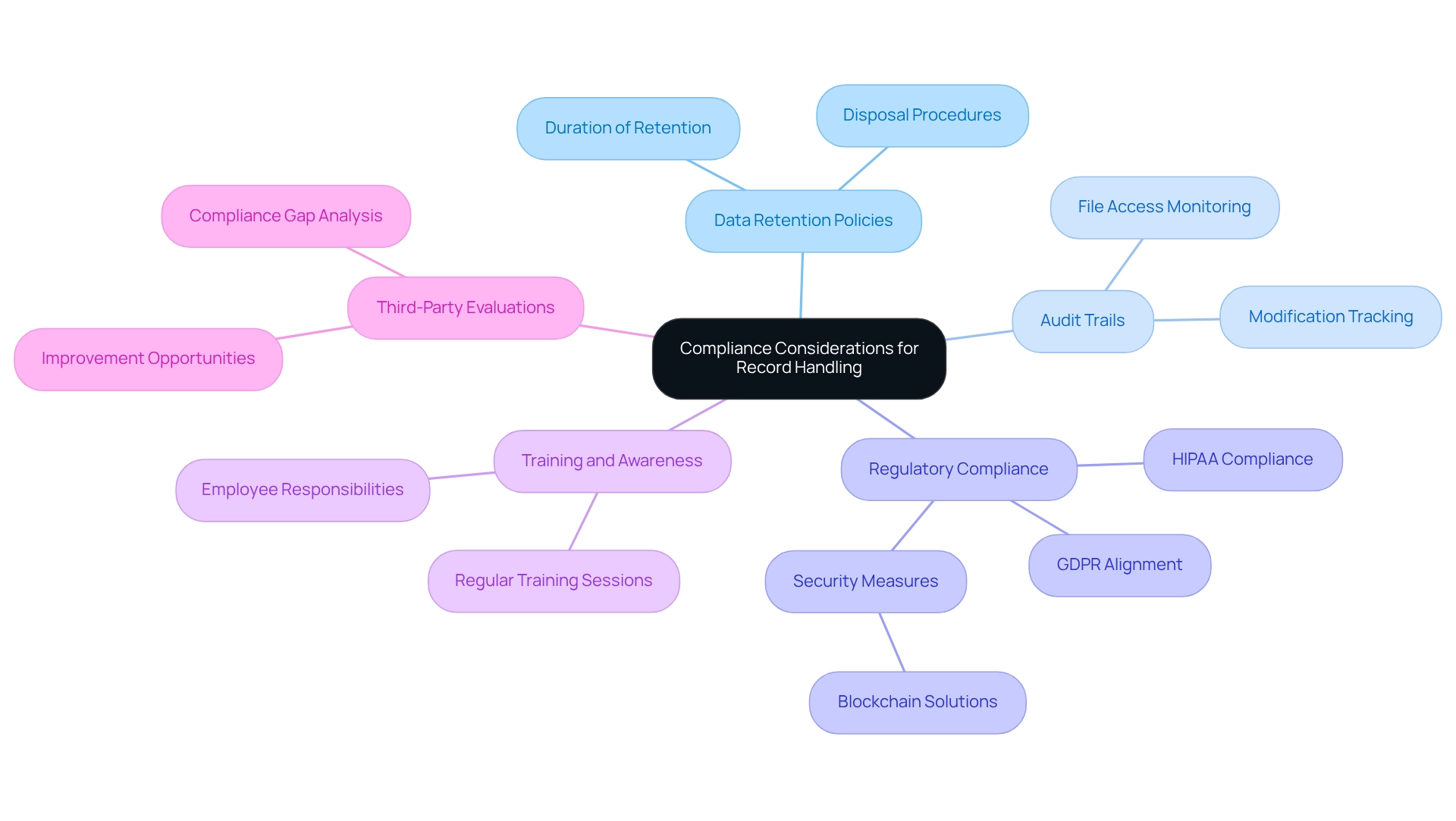
Choosing the Right Document Storage Solution: Key Factors
When selecting a document storage solution, organisations must evaluate several key factors to ensure they choose a system that effectively meets their needs:
- Security Features: The significance of robust security features cannot be overstated. Organisations should assess the security measures provided by the solution, including encryption standards, access controls, and compliance certifications. This service excels in this area, offering advanced encryption, adherence to electronic signature legality, and features such as ID checks, making it an ideal option for sensitive transactions like M&A, insolvency, and real estate. With 69% of employees relying on dedicated file-sharing services due to concerns over data breaches associated with traditional email platforms, prioritising security is essential.
- User-Friendliness: An intuitive and user-friendly interface is crucial for fostering adoption among employees. The application is designed with user-friendliness in mind, reducing the learning curve and significantly enhancing productivity. Organisations should seek systems that have been positively evaluated for ease of use, as this leads to smoother transitions and better overall engagement. As Mark Fairlie, a Senior Analyst, states, “Your file control software should be intuitive, budget-friendly, secure, and collaborative.”
- Integration Capabilities: The ability to seamlessly integrate with existing systems and workflows is vital for enhancing operational efficiency. The customisable portal groups and comprehensive management tools, including tailored workflow processes, facilitate easy integration with other tools used within the organisation, streamlining processes and reducing redundancy while promoting collaboration among teams.
- Scalability: As organisations grow, their document storage needs will evolve. The system is designed to scale accordingly, accommodating increased data volumes and additional users without compromising performance, which is essential for businesses in dynamic sectors like legal services.
- Cost: A thorough analysis of the total cost of ownership is necessary. This encompasses not only subscription fees but also maintenance costs and any potential hidden expenses that may arise. Organisations should ensure that the chosen solution provides value for money while meeting their specific requirements. This platform offers a comprehensive range of features that enhance security and efficiency, rendering it an economical option for legal firms.
By considering these factors, organisations can make informed decisions that align with their specific needs, particularly in the legal sector where compliance, security, and online document storage are paramount. Moreover, with over 10,000 firms globally utilising this service, it is evident that selecting a reliable management solution is vital for improving management processes while ensuring both security and efficiency in operations.
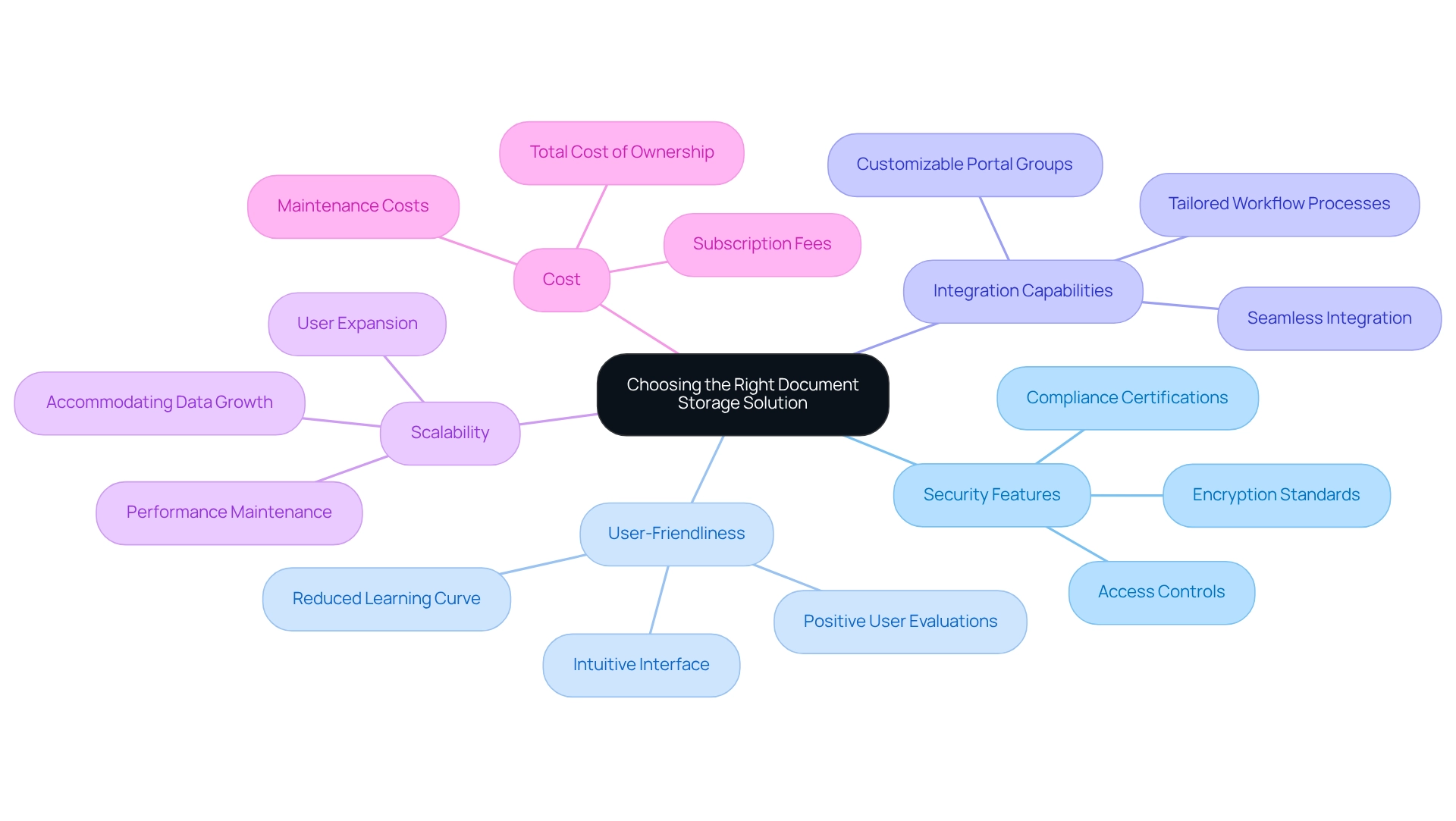
Leveraging Automation in Document Storage: A Modern Approach
To effectively leverage automation in document storage, organisations can adopt several strategic approaches with MyDocSafe’s solutions:
- Automated Routing of Files: Implement automation to efficiently direct files to the appropriate personnel for review and approval. The platform enhances this process by enabling users to request and collect various files from clients and colleagues through a single email, thereby reducing delays and boosting overall workflow efficiency.
- Smart Indexing: Utilise smart indexing solutions that automatically categorise and tag files based on their content. This greatly enhances searchability, enabling users to swiftly find essential files, further supported by advanced file management capabilities.
- Notifications and Reminders: Set up automated alerts and reminders for essential file reviews, expirations, and compliance checks. The platform’s system ensures prompt actions are implemented, significantly lowering the chance of oversight, especially in compliance-intensive settings.
- Integration with Other Tools: Seamlessly combine file management solutions with other essential business tools, such as CRM and project management systems. The application integrations of this service streamline workflows and enable efficient data sharing across departments, enhancing collaboration.
- Regular Updates: Maintain a routine of consistent updates for the storage system to incorporate the latest automation features and security enhancements. The service guarantees that all sensitive files are protected with high-level encryption, akin to that utilised by financial institutions, thereby strengthening data security.
- Advanced E-Signature Software: Utilise the advanced e-signature software to simplify and streamline proposals with a customisable workflow and entirely paperless quoting process. This feature helps close deals faster and avoids administrative delays.
- Automated AML/KYC Checks: Incorporate automated AML/KYC checks to enhance compliance and ensure that all necessary identity verifications are completed efficiently.
The effect of automated file routing on efficiency in document storage online is profound. Organisations utilising MyDocSafe’s advanced management solutions report significant improvements in productivity and employee satisfaction. Moreover, statistics indicate that 47% of businesses that have digitised their record processes have successfully attracted new customers, underscoring the competitive edge achieved through automation.
As David Kostya pointed out, ‘46% of small enterprises indicated that they squander time every day due to paper-heavy procedures,’ highlighting the necessity of implementing automation in file management. As we advance deeper into 2025, the trend of utilising automation in file management continues to gain momentum. Over 90% of small and medium-sized businesses are likely to consider AI and automation services to enhance their competitive positioning.
By adopting these strategies with MyDocSafe, organisations can not only enhance their management processes but also ensure a secure and efficient operational environment. START A free trial today to experience the benefits firsthand.
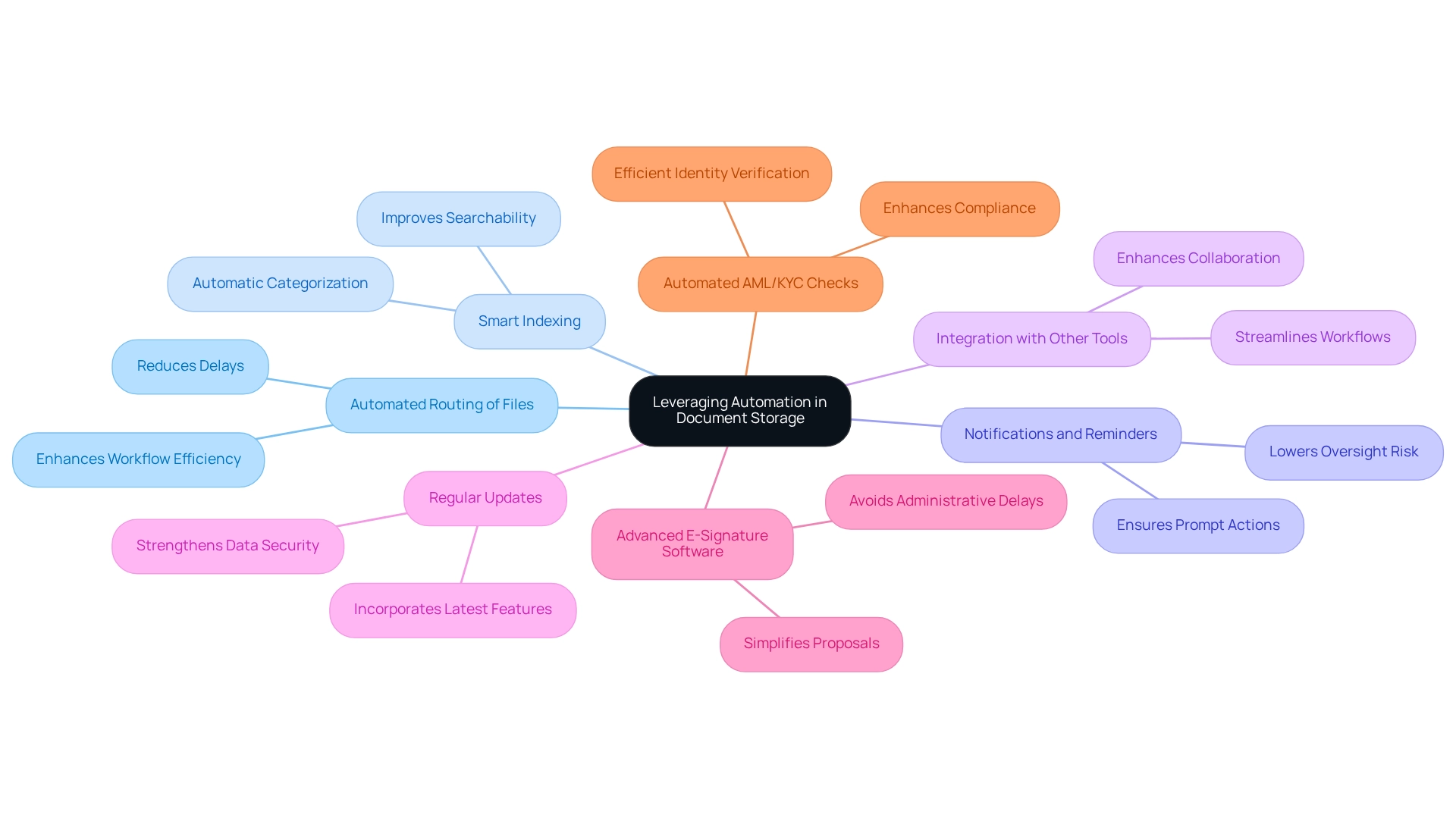
Practical Tips for Effective Online Document Storage
To implement effective online file storage practices, consider the following strategies:
- Organise with Folders: Develop a logical folder structure that mirrors your business processes. This method streamlines information retrieval and reduces knowledge loss when essential team members depart, ensuring continuity in operations.
- Use Consistent Naming Conventions: Establish and consistently apply naming conventions for files. This practice improves searchability and organisation, facilitating team members in swiftly finding essential files.
- Regularly Review and Purge: Conduct periodic assessments of stored files and eliminate those that are no longer relevant. This assists in maintaining a structured system and enhances space usage, which is vital for efficiency.
- Train Staff: Invest in training programmes for employees on best practices for file storage and organisation. Ensuring that all team members are aligned on these practices is crucial for maintaining an effective information management system. As Tara Kachaturoff noted, MyDocSafe’s ease of use for managing client contracts highlights the importance of user-friendly systems in training.
- Utilise Search Features: Leverage the advanced search capabilities offered by file storage solutions. These features can greatly improve productivity by enabling users to swiftly find files, thereby streamlining workflows.
In 2025, the significance of arranging files with folders cannot be overstated, as it directly impacts retrieval efficiency. Organisations such as Portland State University Library have demonstrated the efficiency of organised record handling, where comprehensive inventory reports assist in decision-making and resource distribution. With more than 10,000 businesses globally employing MyDocSafe’s secure electronic signature solutions and file handling services, the focus on safe and efficient storage practices is more pertinent than ever.
By adopting these best practices, organisations can enhance their document management processes through online document storage and ensure compliance with industry standards.
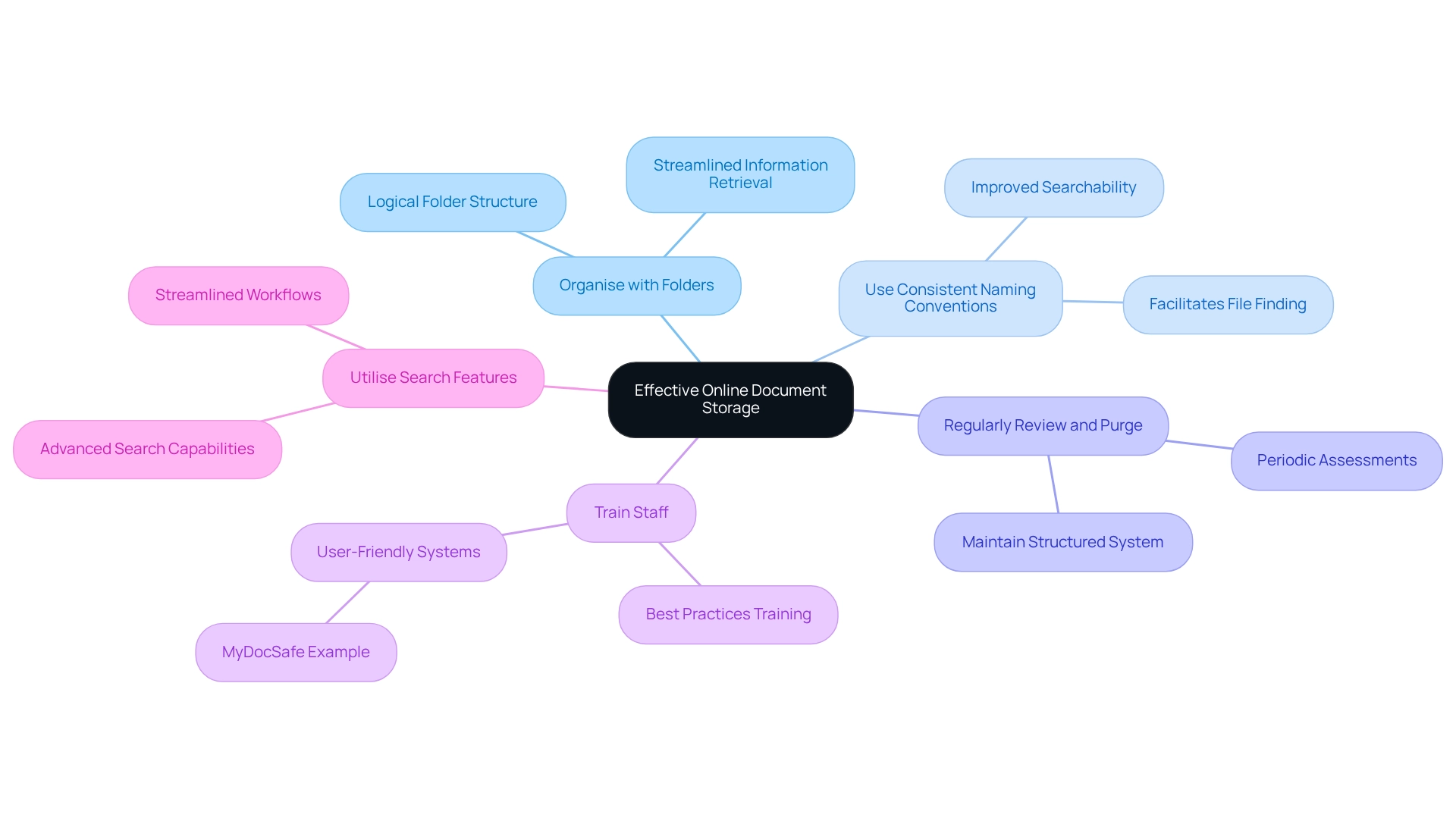
Conclusion
Online document storage represents a transformative approach for organizations grappling with the complexities of digital management. By embracing solutions like MyDocSafe, businesses can significantly enhance their operational efficiency, streamline collaboration, and ensure compliance with regulatory standards. The advantages of cloud document storage—accessibility, cost efficiency, and scalability—are vital for companies, especially in sectors like legal and healthcare, where secure and efficient document management is paramount.
Moreover, prioritizing security through practices such as encryption, access controls, and regular audits is essential in safeguarding sensitive information. As organizations increasingly adopt automated workflows and centralized storage, the importance of effective document management becomes even more pronounced. The integration of advanced features not only improves productivity but also fosters a culture of compliance, enabling businesses to navigate the challenges of a rapidly evolving digital landscape.
In conclusion, as the demand for efficient and secure document handling continues to grow, investing in robust online document storage solutions is no longer optional—it’s a necessity for success. Organizations that proactively adapt to these changes will not only improve their internal processes but also position themselves competitively in the marketplace. Embracing this digital transformation journey with tools like MyDocSafe can empower businesses to thrive amidst the complexities of modern operations.




